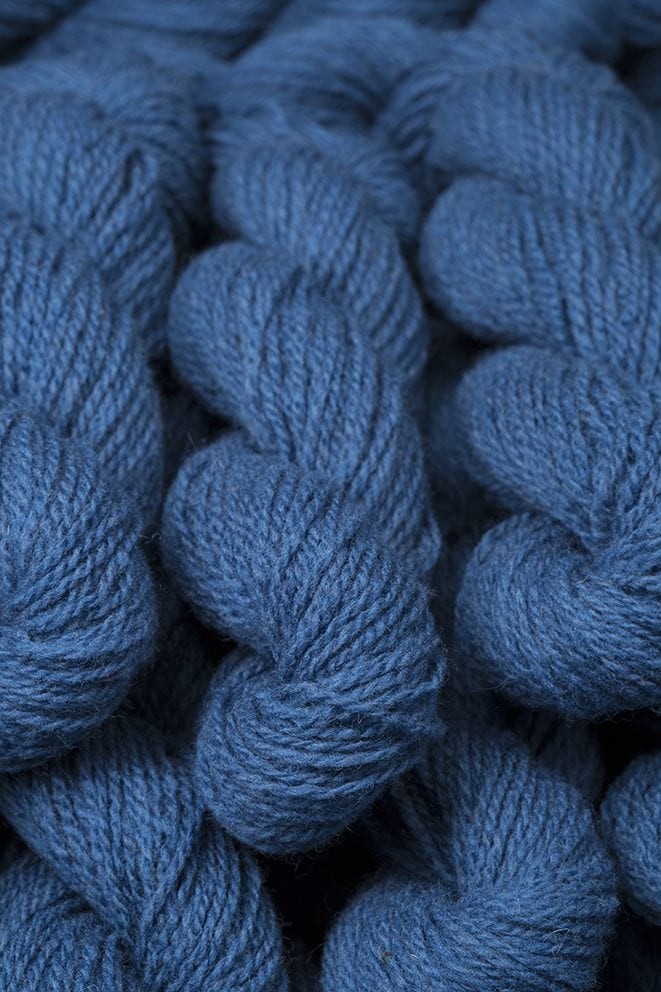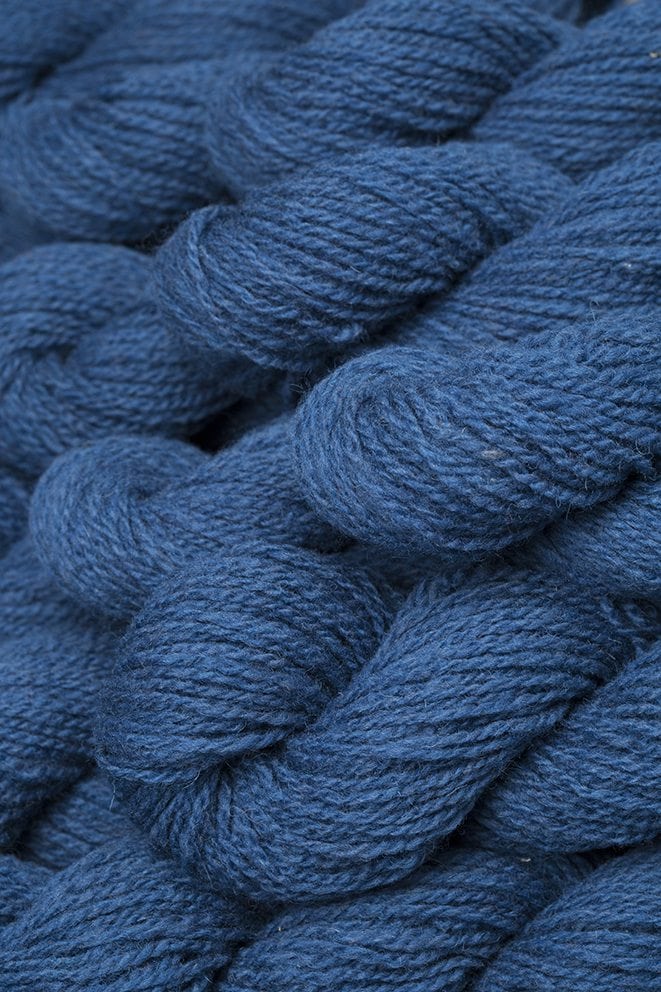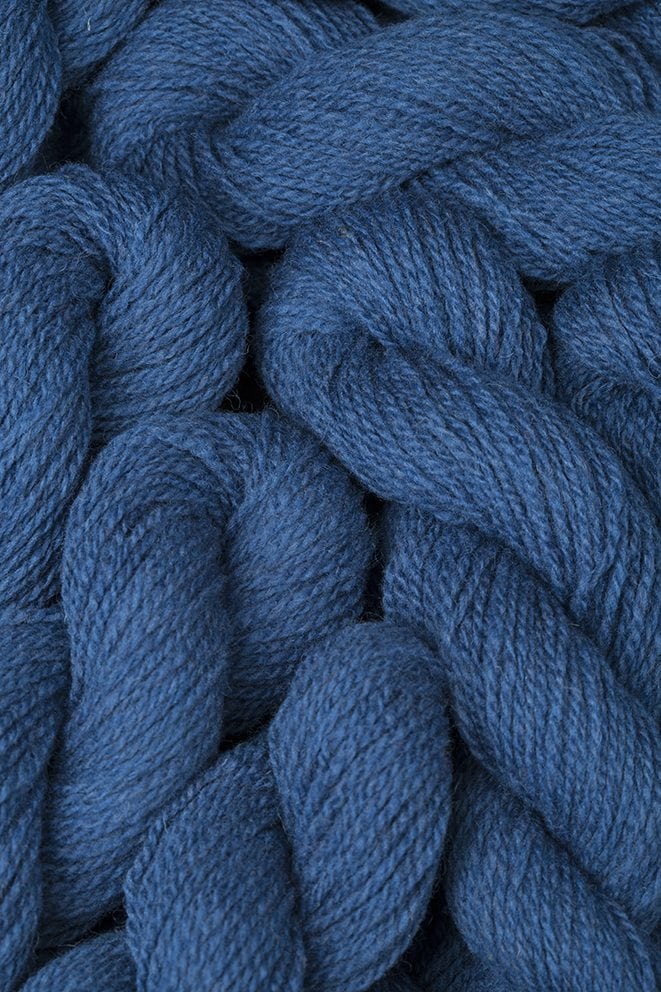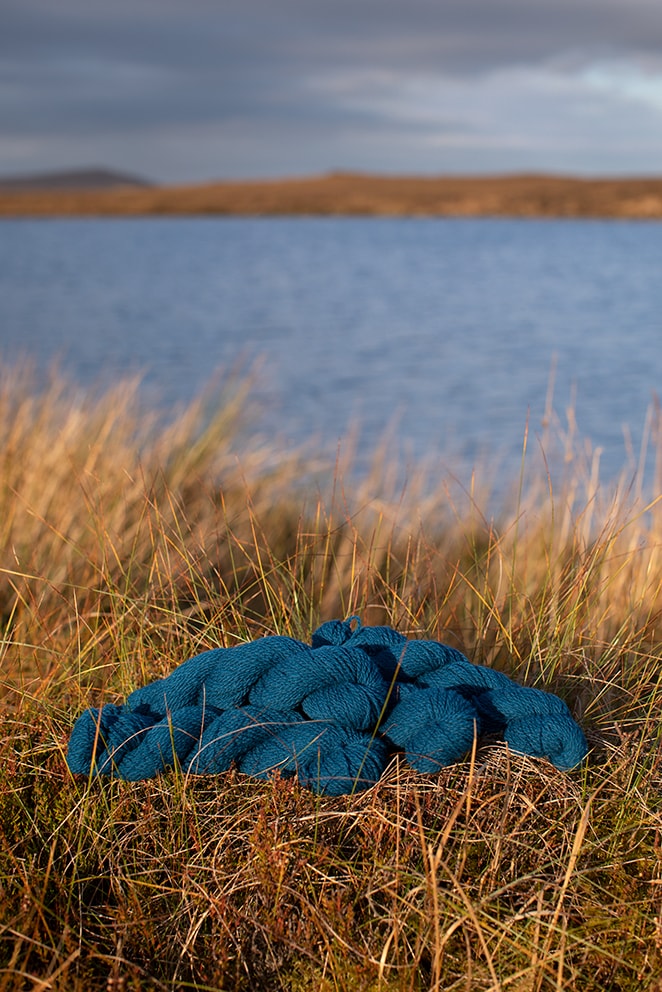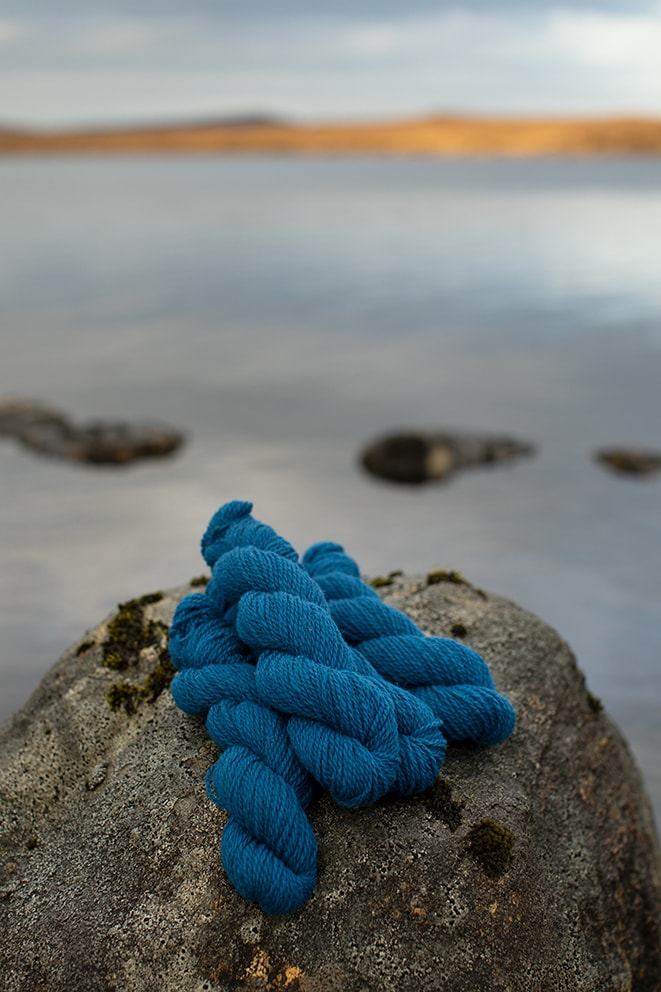Mara – 50g Hebridean 2 Ply
Description
Alice Starmore Hebridean 2 Ply Yarn is made from premium quality pure new British wool, dyed in the fleece and skillfully blended into unique shades. It is hand-washed and dried in the Hebridean air, and supplied in hand-made skeins which may vary in weight. It is priced per 50g at standard conditions. All yarn is weighed to order on balances that are checked daily to ensure that you receive the correct total amount.
Mara is part of the Sea & Shoreline range, which is inspired by the Hebridean coast.
£8.00
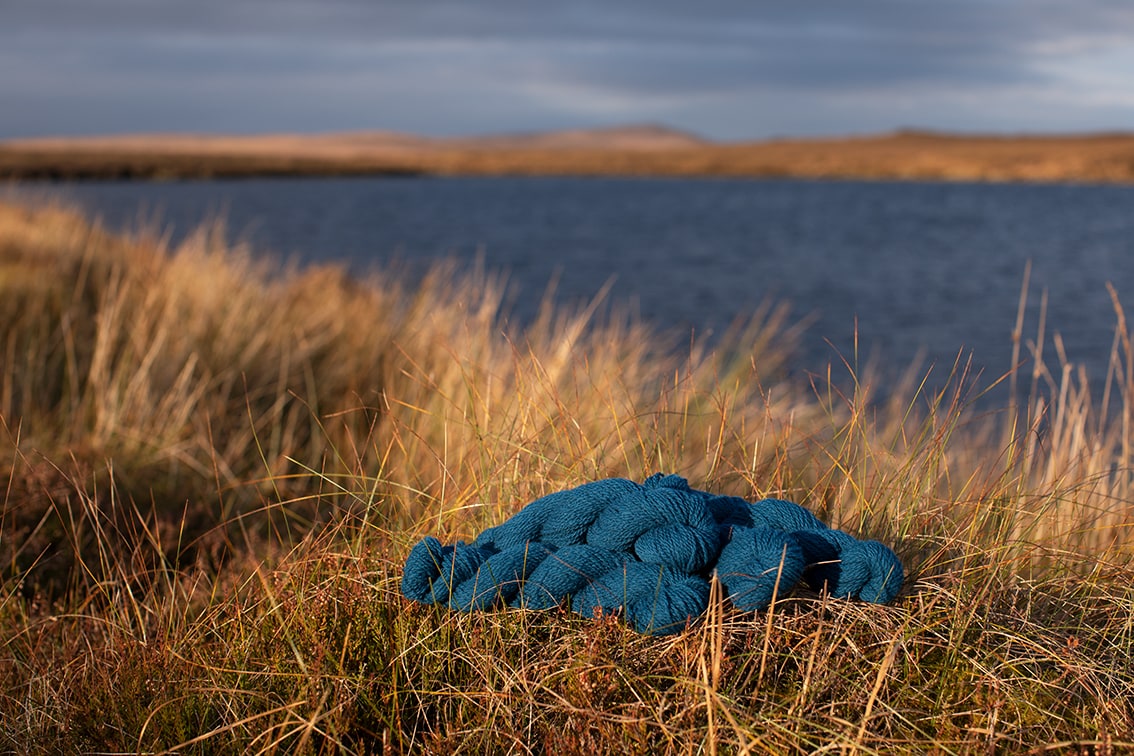
Mara Colour Story
Mara is simply the Gaelic word for sea. I wanted a definitive sea colour for our range, and a very particular one at that. I wanted the bluest sea, as when the tide is coming in during warm weather; when it is getting late but there is still a lot of light about. This blend captures the mood to perfection.
Mara is a short but beautiful name and visitors sometimes wonder why there are no Hebridean girls so called. The answer is simple - how many girls in English-speaking countries do you know who are called Sea? I do happen to agree that there is music in the two short syllables, and so here is a tale about a Hebridean girl called Mara. The girl on whom the story is based probably wasn't called Mara, but her name is unrecorded as far as I know, so I think I have licence to call her what I like.
Mara Macleod was a Siarach, which means she came from the west side of the island. She was born in the village of Garenin, near Carloway on the Atlantic coast of Lewis, in 1791. Mara was a rarity in her time as she was an only child. If a Lewis woman died in childbirth or for any other reason, then her husband would usually marry again soon after and other children would duly arrive. It was rare indeed for a woman to deliver a healthy child; be in perfect health herself, and not fall pregnant again. In fact it was so rare that no-one could understand it, least of all Mara's parents.
So Mara grew up without brothers or sisters, although she had an army of cousins to play with. She was not regarded as an especially beautiful child, for in that time and that place, it was thought advantageous for a female to have rosy cheeks and a bit of flesh on her bones. Mara was a pale-faced, spindle-shanked will o' the wisp who looked as if the wind could pick her up and carry her away. Also, her thick black hair was wild and rampant, unlike the glossy tresses that were so much admired. Her eyes were serene and grey, with flecks like the coat of a seal pup, and so they also fell short of the Hebridean ideal. Her parents loved her and being their only child, she was the light of their lives. She grew up dutiful to both of them, for not only did she carry water and fuel, she also learned to spin and help with the animals, of which there were a dozen sheep; two cows with calves at foot, and a share in a horse. It was laughingly said that Mara's father had no need of a dog, for she was exceptionally fleet of foot, and could run over stones and bogs as if her feet were not actually touching the ground. Her father laughed with the rest of them, but was proud of his daughter's talent. He diligently worked his croft and although poor, the little family did not go hungry. He never said it out loud, but he did realise that having just one child did have certain advantages.
By the time Mara was eleven years old, she had accompanied her father to town on several occasions for the purpose of selling beasts. It was no surprise therefore that one November day she set out with him for Stornoway, driving a fine bullock before them. There was no road at that time and their way took them across the moor by the route that all west side drovers took. The landmarks were well-known and easy to follow, apart from one featureless tract of bog and heather that lay more or less at the middle of the journey. The day was crisp with a frost that eased their progress, for it made the moor less inclined to be boggy. All went well in the town; a good price was got for the beast, and the father indulged them both in a simple but good meal in a tavern. He fell in with neighbours from the village and several drams were taken. It was six o' clock when they started home, which at that time of year meant it had been good and dark for two hours. There was no moon, but it didn't matter for they were in the company of their fellow villagers and the mood was convivial.
The party was just a few miles out, over the River of the Willow Glen and well past the eminence known as Mary's Hill, when Mara's father realised he had left behind the pack containing the items he had been charged by his wife to purchase in Stornoway. He committed his child to the care of his neighbours and resolved to hurry back to retrieve it, saying he would easily overtake them again before reaching Carloway. They had no reason to doubt his word for he was a man in the prime of fitness.
The first flakes of snow were falling as Mara's father re-crossed the River of the Willow Glen on his way out of town for the second time, his pack securely tied across his shoulders. He proceeded as only a seasoned moorwalker could, going at exactly the right pace to ensure the greatest speed without having to pause for breath. The snow was falling fast and beginning to settle, so he kept up his pace, anxious to be clear of the worst part of the moor before the weather closed in hard. Despite the lack of moon he could see his way by starlight through gaps in the transient clouds. He caught up with the company at the outcrop of rock known as Cleitichean Bheag, where the trail divided either for Carloway to the north or Breasclete to the south. He found them all in good spirits, partly because the flagon had been passed a few times and partly because they were now on the home stretch. What he did not find was his daughter.
It was a distracted and anxious father who flew back across the moor towards the town, shouting Mara's name as loud as he could. The company were mystified. The girl had been with them no more than half an hour previous, walking well as was her habit, and in no sign of distress. How she had come to be separated was utterly beyond their knowledge. Two of them followed Mara's father back through snow that was falling ever rapidly. The hour was late when all three reached the town, exhausted and frantic, for not a trace of the girl had been found.
Many were the willing searchers who went forth from both Stornoway and Carloway next day. The snow had ceased but it covered the moor and made it difficult to see the way. It did give the advantage of maybe showing footprints that Mara might have left, but there was not the slightest sign. The search continued all day; then the next, and the next. The wind backed to the south and a gale blew up which wiped away the snow before it, leaving a moor that sucked at the feet and made fast progress impossible. The search parties roamed as best they could, systematically quartering the land from the trail outwards, but still finding nothing.
The effort fell away after three weeks, for common sense dictated that no-one could survive without shelter out on the moor in what was now December. Some continued to aid the haggard parents, who were obviously in no mood to give up. Both father and mother searched together, doggedly putting one foot before the other, for movement became vital to their very being. If they ceased to move then the black despair would grip until they were in danger of losing their reason. Onward they searched, tramping glens and low places deep in the moor that other searchers might have missed. They searched the clusters of sheilings that folk went to in summer but which were now empty. They looked under the overhanging heather of the streambanks, and they stared out over the inky surface of innumerable lochs. At last, on the summit of the highest hill around and known as Beinn Mholach, they stood and hopelessly called out their daughter's name to grey, featureless skies. It was here that a neighbour heard them and came running hard to give them the news that Mara was alive.
She had been found on the seashore near a village called Barvas, some miles northwards up the coast from Carloway. She had been found by a man with a dog, and he had found her unable to walk. She was lying on her face near the surf, licking the salt from sea pebbles. Of how she had managed to get there, she had no recollection whatsoever. All she could say was – the sound of the waves had led her there.
Mara was tended carefully in the nearest house. She was fed little and often, and was visited by the physician from Stornoway who came without request or fee. Gradually her strength recovered and she showed no lasting injury, but still she could give no account of her weeks out on the moor. The sound of the sea remained her only memory. This remarkable case of preservation caused interest throughout everyone on the island, high and low alike. Lady Seaforth, wife of the island's proprietor, took a special interest in the girl and visited her often. In fact, when Mara was fully restored to health, Lady Seaforth took the unprecedented step of inviting the girl – the daughter of a poor tenant crofter – up to the grand Lodge in Stornoway where she was plied with all manner of unfamiliar delicacies and sweetmeats. The other remarkable event was that Mara's mother fell pregnant the month after her child was restored.
That is more or less the end of the tale. When she turned thirteen, Mara was offered employment in service at Seaforth Lodge, which she accepted and where apparently she was happy. How long she remained in this employment I do not know, for I can find no further record of her, although I will continue to look. All I can add is that for many years after Mara was lost and found, travellers on the moor between the west side and Stornoway would frequently stop about half way and listen for the sound of the sea. Grown men could never hear it, and women but rarely. Children on the other had, always claimed it could be plainly heard – if they listened hard enough – which seems to be the case with many things in this world.

